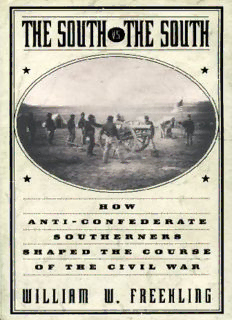
The South Vs. The South: How Anti-Confederate Southerners Shaped the Course of the Civil War PDF
Preview The South Vs. The South: How Anti-Confederate Southerners Shaped the Course of the Civil War
THE S O U TH VS. THE S O U TH Other Oxford Books by William W. Freckling Prelude to Civil War The Nullification Controversy in South Carolina, 1616—1636 Willie Lee Rose Slavery and Freedom (Editor) The Road to Disunion, Volume I Secessionists at Bay, 1776-1854 Secession Debated Georgia's Showdown in 1860 (Co-editor with Craig M. Simpson) The Reintegration of American History Slavery and the Civil War T HE S O U TH VS. T HE S O U TH How Anti-Confederate Southerners Shaped the Course of the Civil War William W. Freckling OXFORD UNIVERSITY PRESS OXFORD UNIVERSITY PRESS Oxford New York Auckland Bangkok Buenos Aires Cape Town Chennai Dar es Salaam Delhi Hong Kong Istanbul Karachi Kolkata Kuala Lumpur Madrid Melbourne Mexico City Mumbai Nairobi Sao Paolo Shanghai Taipei Tokyo Toronto Copyright © 2001 by William W. Freckling First published by Oxford University Press, Inc., 2001 First issued as an Oxford University Press paperback, 2002 198 Madison Avenue, New York, New York 10016 www.oup.com Oxford is a registered trademark of Oxford University Press, Inc. All rights reserved. No part of this publication may be reproduced, stored in a retrieval system, or transmitted, in any form or by any means, electronic, mechanical, photocopying, recording, or otherwise, without the prior permission of Oxford University Press. Library of Congress Cataloging-in-Publication Data Freehling, William W., 1935- The South vs. the South : how anti-Confederate southerners shaped the course of the Civil War / William W. Freehling xv, 238 p. : ill., maps ; 25 cm. Includes bibliographical references (pp. 207-230) and index ISBN 0-I9-5I3027-8 (cloth) ISBN IO-19-5I5629-3 (pbk) I. Confederate States of America—Politics and government. 2. Confederate States of America—Social conditions. 3. Slaves—Southern States—Political activity—History—I9th century. 4. African Americans—Southern States—Politics and government—19th century. 5. Unionists (United States Civil War). 6. Whites—Southern States—Politics and government—19th century. 7. United States Army—Southern Unionists. 8. United States—History—Civil War, I86I-I865—Social aspects. I. Title. E487 .F83 2001 973.7'I-dc21 00-51678 135798642 Printed in the United States of America For Alison Freehling Johnson and William Goodyear Freehling This page intentionally left blank Contents Preface xi Part One: The Other House Divided 1 The Union's Task 3 2 Fault Lines in the Pre-Civil War South 17 3 The Secession Crisis 33 Part Two: Southern White Anti-Confederates 4 From Neutrality to Unionism 47 5 The Jackpot 65 Part Three: Southern Black Anti-Confederates 6 The Delay 85 7 The Collaboration 115 8 The Harvest 141 Part Four: Last Full Measure 9 The Last Best Hope 177 10 The Taproot and Its Blight 201 Notes 207 Index 231 This page intentionally left blank Maps and Illustrations Maps (by Donald S. Frazier, McMurry University) The Watery Anaconda 9 The Landed Anaconda 9 The Three Souths 19 Grant s Jackpot 70 The Vicksburg Anaconda 148 Chickamauga and Chattanooga 156 Shermans March to the Sea 164 The Virginia Anaconda 172 Illustrations John Hunt Morgan 5 Nathan Bedford Forrest 5 Confederate Guerrillas' Railroad Devastation 5 Union Railroad Repairs 10 Repairs Finished 10 Confederate General Albert Sidney Johnston 67 Union General Henry Halleck 67 The Gunboats at Fort Henry 75
Description: